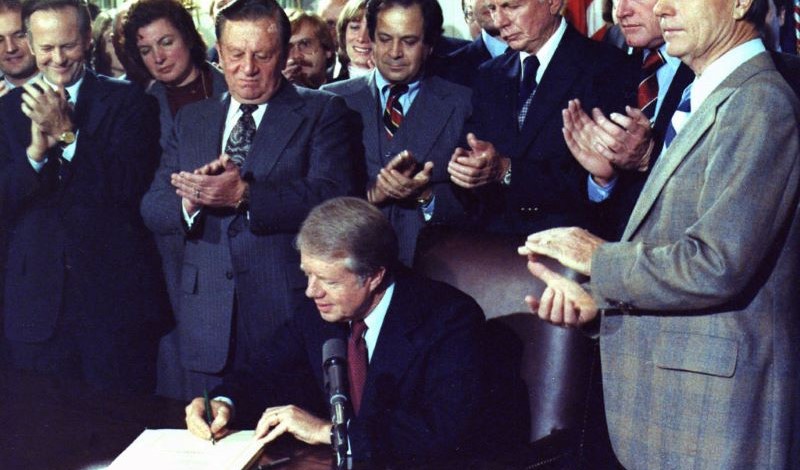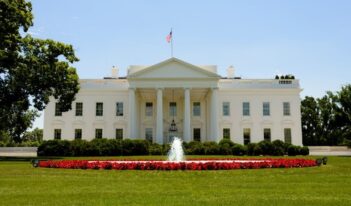
By pushing for deregulation and adopting other reforms, President Carter left an enduring legacy on the U.S. regulatory system.
Since he announced his plans to enter hospice care, tributes have begun to pour in for former President Jimmy Carter, whose greatest contrast with recent presidents may be his manifest humility. One part of his legacy should be getting more attention, especially in these polarized times and as Americans experience inflation rates reminiscent of the late 1970s. President Carter deserves credit for setting in motion a wave of economic deregulation that led to lasting improvements in social welfare.
President Carter faced many challenges during his presidency, including the Iranian hostage crisis, OPEC oil embargo, Nicaraguan revolution, Soviet invasion of Afghanistan, a nuclear accident at Three Mile Island, and runaway inflation. He certainly made some missteps but, as inflation climbed, he had the sense to ask whether his own government’s policies could be exacerbating it. The Federal Reserve’s actions were important of course, but President Carter also considered less obvious culprits, including poorly designed regulation.
When President Carter took office in 1977, a multitude of new regulatory agencies—including the U.S. Environmental Protection Agency, Occupational Safety and Health Administration, Federal Energy Administration, U.S. Consumer Product Safety Commission, and more—were launching ambitious agendas. Traditional economic regulatory agencies, such as the Interstate Commerce Commission (ICC) and Civil Aeronautics Board (CAB) were also busy setting rates and conditions for trains, trucks, pipelines, buses, and airlines.
Could all this regulatory activity contribute to rising prices?
Evidence had been mounting over the previous decade that the economic regulatory agencies were susceptible to political capture by their regulated industries, and that price controls—supposedly aimed at protecting consumers from monopolistic pricing—seemed to accomplish exactly the opposite result. President Carter enticed Cornell economics professor Alfred Kahn to Washington to head the CAB. Although not initially inclined to remove price regulation altogether, Kahn, with support from President Carter, soon realized that complete deregulation was the only hope for a more competitive and consumer-focused airline industry. In 1978, President Carter signed the Airline Deregulation Act, clearing the way for the CAB to be abolished a few years later.
President Carter later appointed Darius Gaskins, one of Kahn’s deputies at the CAB, to chair the ICC. The great success of airline deregulation paved the way for deregulation in other transportation modes and in telecommunications. In 1980, President Carter signed the Motor Carrier Act, which deregulated the trucking industry, the Staggers Rail Act, which introduced competition in rail rates, and the Telecommunications Act, which removed restrictions on long-distance phone service. These actions allowed new entrants into the markets, increased efficiency, lowered prices, offered consumers more choices, and likely contributed to declining inflation. Thanks in no small part to President Carter, competition in formerly regulated markets has not just reallocated resources but unleashed innovation and generated tens of billions of dollars in lasting benefits for consumers and society as a whole.
President Carter also focused attention on the newer regulatory agencies and on increasing concerns over red tape and excessive compliance burdens. In contrast to his approach to economic regulation, which many reformers had agreed should just be removed, President Carter approached health, safety, and environmental regulation by focusing on “improved regulatory management…and the adoption of less-intrusive regulatory techniques.” He set up cabinet-level oversight councils to review the new agencies’ most important regulatory proposals and to encourage more cost-effective forms of regulation.
His Executive Order 12044 required agencies to analyze the impact of proposed regulations and make those analyses publicly available. The order stressed practices that every succeeding president has embraced, including assessing the benefits and costs of alternatives. It also directed agencies to adopt the least burdensome approach to achieving regulatory goals and to embrace flexible regulatory alternatives and market mechanisms in lieu of traditional command and control regulation.
In addition to sector-specific legislation, President Carter signed into law two significant cross-cutting regulatory reform bills. The Regulatory Flexibility Act required agencies to analyze the impact of their regulatory actions on small entities and consider effective alternatives that would minimize those impacts. The Paperwork Reduction Act created the Office of Information and Regulatory Affairs (OIRA) in the Office of Management and Budget to review and approve all new reporting requirements.
President Carter also supported legislation to “make the regulatory analysis called for in Executive Order 12044 a permanent requirement and extend the order to cover the independent regulatory agencies.” He even entertained the need for a regulatory budget to ensure “the first problems addressed are those in which regulations are likely to bring the greatest social benefits.”
Although President Carter did not succeed at getting legislation passed that codified his regulatory analysis requirements, he forged a “rough consensus both inside government and among academic critics on the proper underlying principles for regulatory reform.” Each successive president has built on those principles, and the benefit-cost balancing President Carter championed has become standard practice in federal agencies and is increasingly expected by courts when they review agency regulations.
With President Carter’s leadership, bipartisan efforts across all three branches of government eventually led to the removal of unnecessary regulation in several previously regulated industries, paving the way for mobile phones, lower airfares, and reduced racial discrimination in certain labor markets.
When Americans open their smart phones to make an airline reservation, they should take a moment to thank Jimmy Carter, the humble one-term president whose bold deregulatory initiatives made such welfare-enhancing innovations possible.




